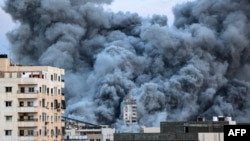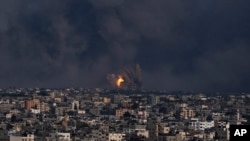Hundreds are dead and thousands injured as Israel engages for a second day in urban fighting with Hamas militants in the streets of southern Israel, while Lebanon's powerful armed group Hezbollah, in a coordinated attack, exchanged artillery and rocket fire with Israel in the north. This follows Hamas’s unexpected incursion Saturday into southern Israel from Gaza.
Hamas fighters poured through Israeli towns, killing 600 people and abducting dozens more, as violence spirals out of control and threatening a major new Middle East crisis. Hamas’s multiple captives — including women, children and the elderly — would be a possible trade off for Palestinians prisoners held by Israel.
U.S. citizens are among those taken captive but there are no details about them, nor about Americans who might have been killed, according to the Israeli strategic affairs minister, Ron Dermer, the Associated Press reports.
Three British men are dead and other Europeans reportedly are dead or missing after Hamas’s incursion.
What is Hamas?
Hamas, a militant movement and one of the two major political parties in the Palestinian territories, took over leadership in the Gaza Strip after its electoral victory in 2006.
Since then, Gaza, a 362-square-kilometer strip of land that’s home to more than 2 million people, has been under a full Israeli-led land, sea and air blockade that prevents people and goods from freely entering or leaving the territory.
Israeli Prime Minister Benjamin Netanyahu said Sunday that his security Cabinet has formally declared his country at war. Netanyahu pledged Saturday to inflict an “unprecedented price” against Hamas militants, and he called for a mass mobilization of army reserves.
Israeli airstrikes battered Gaza Sunday, hitting housing blocks, tunnels, a mosque and homes of Hamas officials in Gaza, killing more than 370 people, including 20 children, as Prime Minister Netanyahu vowed "mighty vengeance for this black day," the Reuters news agency reports.
Meanwhile, Israel is dealing with coordinated attacks from the north by militant Hezbollah. The group said Sunday it had launched guided rockets and artillery onto three posts of Shebaa Farms, part of Israel’s occupied Golan Heights since 1967. The area is a few kilometers away from the Lebanese border. Hezbollah said its attack there signals its “solidarity" with the Palestinian people.
"Our history, our guns and our rockets are with you," said senior Hezbollah official Hashem Safieddine at an event in the Hezbollah stronghold of Dahieh on Beirut's outskirts, Reuters reports.
What is Hezbollah?
Lebanon's Hezbollah, a Muslim Shiite militant group backed by Iran, is driven by its opposition to Israel and its resistance to Western influence in the Middle East. Based in Lebanon, its extensive security apparatus, political organization, and social services network fostered its reputation as “a state within a state.”
Hezbollah’s targeting of Israeli military positions in the disputed Shebaa Farms area points to the possibility of a major new Middle East war spreading beyond blockaded Gaza.
Hamas’ unexpected incursion is reminiscent of the surprise attack by Egyptian and Syrian forces against Israel 50 years ago almost to the day, igniting the 1973 Yom Kippur War that lasted less than three weeks and ended with Israel’s victory.
Why was it called the Yom Kippur War?
The latest of the Arab Israeli wars that shaped Arab-Israeli enmity in the region, the Yom Kippur War was ignited on October 6, 1973. On the holiest day on the Jewish calendar, Yom Kippur, otherwise called the Day of Atonement, Israel was caught off guard by invading forces from Egypt and Syria.
The 19-day war that followed has been considered one of the most traumatic events for the Israeli nation that pledged never to be caught off guard again and ended with Israel’s victory against the Arab forces and a subsequent armistice on October 25, 1973.
That war also put into question Israel’s intelligence failure to offset the surprise attack, as well as the weak performance of the Israel Defense Forces during the war’s first few days, and it mobilized the Israeli people against the Golda Meir government at the time.
Why was Israel once again caught by surprise?
During its 50th anniversary, the Hamas attack again raises questions about Israel’s unpreparedness as it is dealing with domestic political issues once again.
The protest movement that has been mobilized against Netanyahu’s efforts to overhaul the country’s judicial system draws a parallel with Golda Meir’s fledgling government in 1973 and Israel’s government today.
Hamas’s unexpected attack came at a moment of deep division in Israel, as its government pushed through a contentious plan to reduce the power of the country’s courts, sparking a social and political crisis. The move this year also struck a nerve with the military, prompting many reservists – the backbone of Israel’s army – to warn they would not come if called up, to protest the changes to the judicial system.
An Israel Defense Forces spokesperson said Saturday he did not know of any reservists refusing to be called up in the face of the latest attacks, CNN reports.
What is the Hamas argument for attacking Israel?
Israel’s 16-year Gaza blockade is one of Hamas’s arguments for bringing the conflict with Israel to a head. The shadowy leader of Hamas’s military wing, Mohammed Deif, said the assault was in response to the blockade, Israeli raids inside West Bank cities over the past year, violence at the Al Aqsa Mosque — the disputed Jerusalem holy site sacred to Jews as the Temple Mount — increasing attacks by settlers on Palestinians and the growth of settlements.
“Enough is enough,” Deif, who does not appear in public, said in the recorded message, according to the Associated Press. He said the morning attack was only the start of what he called “Operation Al-Aqsa Storm” and called on Palestinians from east Jerusalem to northern Israel to join the fight. “Today the people are regaining their revolution.”
The attacks by Hamas follow one of the deadliest periods in the Israeli-occupied West Bank in nearly two decades. The violence has been driven by frequent Israeli military raids in Palestinian towns and cities, which Israel has said are a necessary response to a rising number of attacks by Palestinian militants on Israelis.
What is the US reaction to the Hamas attack?
President Joe Biden has directed additional support for Israel in the face of this unprecedented terrorist assault by Hamas, the White House said.
In a statement Sunday, U.S. Secretary of Defense Lloyd Austin said, “My thoughts continue to be with the people of Israel and the many families who have lost loved ones as a result of the abhorrent terrorist attack by Hamas.” Austin added he has taken several steps to strengthen the Department of Defense’s posture in the region “to bolster regional deterrence efforts.”
U.S. Secretary of State Antony Blinken also condemned the attack and stated the unequivocal U.S. support of Israel.
In an interview with CNN’s “State of the Union” Sunday, Blinken called the attack the worst since the Yom Kippur war 50 years ago. He made a distinction, however, that the 1973 war was a conventional war fought among counties with conventional armies — as opposed to “this massive terrorist attack on Israeli civilians.”
Blinken echoed President Biden’s comments that the U.S. will provide Israel with whatever help it needs to deal with the situation.
Biden has condemned what he says is the “unconscionable” assault by Hamas militants and his administration is pledging to ensure Israel has “what it needs to defend itself.” Biden spoke after the unexpected strike that has drawn worldwide condemnation and anger from Israel’s allies.
Biden said at the White House Saturday he told Netanyahu that the United States “stands with the people of Israel in the face of these terrorist assaults. Israel has the right to defend itself and its people, full stop." The president also warned Israeli’s enemies that “this is not a moment for any party hostile to Israel to exploit these attacks to seek advantage. The world is watching.”
What is the reaction around the rest of the region?
Turkish President Recep Tayyip Erdogan said Sunday that Turkey was determined to increase its diplomatic efforts to de-escalate tension and restore calm in the area. He added that a two-state solution between Israel and the Palestinian territories was the only way to achieve permanent regional peace.
"So long as this problem is not resolved in a fair way, our region will continue to live in longing of peace," Erdogan said in a speech in Istanbul.
Palestinian President Mahmoud Abbas told Secretary Blinken Saturday that "injustice" toward Palestinians is driving the conflict with Israel to an "explosion,” Reuters cited Palestinian news agency WAFA as saying Saturday.
In a phone call, Abbas also stated the ongoing escalation is down to the "practices of the colonialists and the Israeli occupying forces, and the aggression against Islamic and Christian sanctities," according to WAFA.
Egypt is also in talks with Saudi Arabia and Jordan to defuse the Palestinian - Israeli tensions, the Egyptian foreign ministry said Saturday, according to Reuters.
Egypt's foreign minister, Sameh Shoukry, in phone calls with his Saudi and Jordanian counterparts, underlined the importance of "uniting international and regional efforts" to contain the escalating violence, a statement read.
Some information for this report came from Reuters and The Associated Press.






